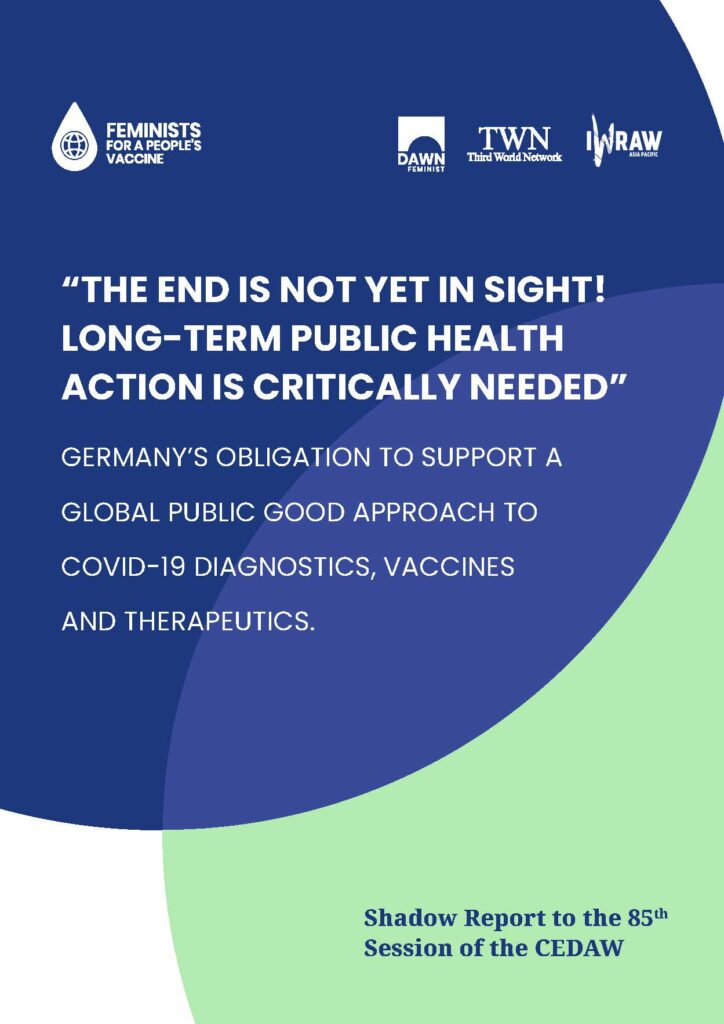
I am Kumi Samuel from DAWN[1] making this submission on behalf of Feminists for a People’s Vaccine Campaign, representing 21 major feminist networks and organizations, and growing.[2] We focus here on the impact of the TRIPS Agreement[3], and the opposition to a waiver of intellectual property (IP) on COVID-19 vaccines, diagnostics, therapeutics and other needed medical products by a few countries including Sweden as a member of the EU.
This opposition has severe and disproportionate impacts on the rights of women and girls in low and middle-income countries, raising concerns about Sweden’s compliance with its:
- extraterritorial obligations under CEDAW, including duties to meet the standards of substantive equality and non-discrimination when operating within the multilateral system and as a member of the EU;
- duties of international cooperation and assistance, including refraining from infringing on the ability of other States to fulfill their own human rights obligations; and
- commitments under its Feminist Foreign Policy.
As the EU continues to deny the TRIPS waiver thereby preventing the free production of vaccines and other products, absolutely essential to curb the spread of the virus, Sweden itself has received 9 times more vaccines from major pharmaceutical companies than all low-income countries combined,[4] which, as of early October 2021, had only vaccinated 2.5% of their populations with at least one dose.[5]
We do not believe the alternate Pandemic Treaty[6] proposed by the EU – and by extension, supported by Sweden – as a counter to the TRIPS Waiver will resolve the immediate problem of access to vaccines and other needed products, noting also that it is a proposal for future pandemics. The Treaty is also dependent on the willingness of Big Pharma to share technology and knowledge through voluntary licensing that has proved to be untenable[7].
Equitable access to Vaccines and related products is of paramount importance to curb the COVID-19 pandemic, and to its effects on health and wellbeing and to reverse its deleterious effects on women’s rights. These include the collapse in women’s jobs and incomes; a sharp decline in both the quantum and the quality of women’s work participation; huge increases in women’s unpaid care work; and the hidden pandemic of violence against women as a result of lockdowns.
We urge the Committee therefore to call on Sweden inter alia
- to refrain from making or contributing to the making of laws and policies which directly or indirectly result in the denial of women’s equal enjoyment of their rights, territorially or extraterritorially;
- to refraining from supporting policies that prevent access to vaccines, medical products and treatments needed to respond to COVID-19;
- to conduct a comprehensive and participatory review of its Feminist Foreign Policy, including its Feminist Trade Policy, to ensure policy coherence and compliance with CEDAW across all areas of its international trade obligations;
- to ensure that its actions within WTO, including vis-a-vis its membership in the EU, recognise the primacy of its international human rights obligations over intellectual property regimes.
END
[1] This submission is made by Development Alternatives with Women for a New Era (DAWN), the Third World Network (TWN) and International Women’s Rights Action Watch (IWRAW) on behalf of Feminists for a People’s Vaccine Campaign
[2] thttps://feminists4peoplesvaccine.org/#about
[3] Agreement on Trade-Related Aspects of Intellectual Property Rights
[4] https://twitter.com/peoplesvaccine/status/1442822811173670915?s=08
[5] Hannah Ritchie, Edouard Mathieu, Lucas Rodés-Guirao, Cameron Appel, Charlie Giattino, Esteban Ortiz-Ospina, Joe Hasell, Bobbie Macdonald, Diana Beltekian and Max Roser (2020) – “Coronavirus Pandemic (COVID-19)”. Published online at OurWorldInData.org. Retrieved from: ‘https://ourworldindata.org/coronavirus’ [Online Resource]
[6] Please see discussion on page 9 of our Shadow Report
[7] The propensity of Big Pharma’s concern for profits and not people’s health has been on display during pandemics (HIV/AIDS and SARS COV-2) and for life-threatening conditions (Hepatitis C and Breast Cancer) Voluntary licensing itself is especially problematic because it excludes those living in countries that are regarded as lucrative markets for pharmaceutical companies. Even under a voluntary license, pharma companies control where the product is manufactured and supplied. The continuing global shortages and highly inequitable access to COVID-19 vaccines are a testimony to the failure of voluntary licensing.

